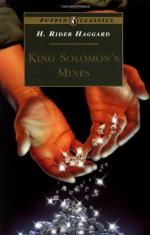“Go back, thou dog, to Twala, who sent thee, and say that we, Ignosi, veritable king of the Kukuanas, Incubu, Bougwan, and Macumazahn, the wise ones from the Stars, who make dark the moon, Infadoos, of the royal house, and the chiefs, captains, and people here gathered, make answer and say, ’That we will not surrender; that before the sun has gone down twice, Twala’s corpse shall stiffen at Twala’s gate, and Ignosi, whose father Twala slew, shall reign in his stead.’ Now go, ere we whip thee away, and beware how thou dost lift a hand against such as we are.”
The herald laughed loudly. “Ye frighten not men with such swelling words,” he cried out. “Show yourselves as bold to-morrow, O ye who darken the moon. Be bold, fight, and be merry, before the crows pick your bones till they are whiter than your faces. Farewell; perhaps we may meet in the fight; fly not to the Stars, but wait for me, I pray, white men.” With this shaft of sarcasm he retired, and almost immediately the sun sank.
That night was a busy one, for weary as we were, so far as was possible by the moonlight all preparations for the morrow’s fight were continued, and messengers were constantly coming and going from the place where we sat in council. At last, about an hour after midnight, everything that could be done was done, and the camp, save for the occasional challenge of a sentry, sank into silence. Sir Henry and I, accompanied by Ignosi and one of the chiefs, descended the hill and made a round of the pickets. As we went, suddenly, from all sorts of unexpected places, spears gleamed out in the moonlight, only to vanish again when we uttered the password. It was clear to us that none were sleeping at their posts. Then we returned, picking our way warily through thousands of sleeping warriors, many of whom were taking their last earthly rest.
The moonlight flickering along their spears, played upon their features and made them ghastly; the chilly night wind tossed their tall and hearse-like plumes. There they lay in wild confusion, with arms outstretched and twisted limbs; their stern, stalwart forms looking weird and unhuman in the moonlight.
“How many of these do you suppose will be alive at this time to-morrow?” asked Sir Henry.
I shook my head and looked again at the sleeping men, and to my tired and yet excited imagination it seemed as though Death had already touched them. My mind’s eye singled out those who were sealed to slaughter, and there rushed in upon my heart a great sense of the mystery of human life, and an overwhelming sorrow at its futility and sadness. To-night these thousand slept their healthy sleep, to-morrow they, and many others with them, ourselves perhaps among them, would be stiffening in the cold; their wives would be widows, their children fatherless, and their place know them no more for ever. Only the old moon would shine on serenely, the night wind would stir the grasses, and the wide earth would take its rest, even as it did aeons before we were, and will do aeons after we have been forgotten.




